In partnership with the Northeast Healthy Soil Network, Food Solutions New England (FSNE) hosted the following policy solutions webinar as part of the FSNE Campaign for Climate Resilience:
This webinar explored the trajectory and impact of USDA investments in Conservation and Climate-Smart programs on climate resilience and farm viability in New England.
Healthy Soils Bills Legislative Status

Policy Brief by Anne-Marie Codur, Caroline MacDonald, and Jonathan Harris
Regenerative Agriculture: From International to Local
3rd Symposium of the Northeast Healthy Soil Network
Transitioning to More Regenerative Practices in the Northeast:
Towards Inclusive and Fair Compensation for Farmers and Other Soil Health Stewards
March 16-17, 2023

The Northeast Healthy Soil Network (NEHSN) organized its third symposium on March 16th and 17th, 2023, with the goal of reigniting the NEHSN network in the post-pandemic period, and realigning regional policy goals in light of the new funding opportunities that might be offered by the 2023 Farm Bill, the Inflation Reduction Act, and other funding mechanisms from the private sector, helping to sustain the transition of farms towards more regenerative practices.
Through 4 high-level panels including experts and practitioners from the US and Europe, and 2 workshops bringing together NESHN’s members from academia, NGOs, and the private sector, this Symposium has helped the NESHN network redesign its mission and priorities for the months to come, in view of creating a more sustained platform for farmers and other healthy soils stakeholders and advocates in the Northeast region.
For more information on NEHSN or to sign up for our listserv please email
infoNEHSN@gmail.com
Thursday, March 16th: Funding the Transition Towards More Regenerative Practices
Opening Remarks: Mireille Guyader, Ph.D., Counselor for Science and Technology, Embassy of France in the US. Read her speech here
Panel 1: “Comparative Lessons Learned at the International Level”, Presentations & Video Link
Panel 2: “Investment in Regenerative Agriculture in the Northeast”, Presentations & Video Link
Friday, March 17th: Promising Regenerative Practices in the Northeast
Panel 3: Towards a More Resilient Northeast Agroecosystem, Presentations & Video Link
Panel 4: Soil Health & Equity, Presentations & Video Link
Acknowledgments:
NEHSN expresses its immense gratitude to all its sponsors:
- The French Ministry of Agriculture and Food Sovereignty
- The Embassy of France in Washington D.C.
- The consulate General of France in Boston
- American Farmland Trust
NEHSN’s symposium was co-organized by:
- The Northeast Organic Farming Association of New Hampshire (NOFA NH)
- Food Solution New England, at the University of New Hampshire Sustainability Institute
- The Global Development and Environment Institute at Tufts University
- NEHSN is also extremely grateful to The International 4per1000 initiative for its continued partnership since NEHSN’s inception in 2018.
Full Program
Funding the Transition Towards More Regenerative Practices
Panel 1: “Comparative Lessons Learned at the International Level”
- Paul Luu: 4per1000, Executive Secretary
- Chelsea Gazillo: American Farmland Trust, New England Policy Manager
- Debbie Reed: Ecosystem Services Market Consortium, Executive Director
- Max DuBuisson: Indigo Ag, VP, Sustainability Policy and Engagement
- Sylvain Maestracci: French Ministry of Agriculture
Moderator: Anne-Marie Codur, Tufts University, Global Development and Environment Institute
Panel 2: “Investment in Regenerative Agriculture in the Northeast”
- Gina Asoudegan: Applegate Farms, VP, Mission and Regenerative Agriculture
- Calla Rose Ostrander: Terra Regenerative Capital, Managing Partner
- Tad Cooke: Larklea, Principle
- Brandon Welch: Mad Agriculture, Co-Founder, CEO
- Jenna DeRario: Cornell Cooperative Extension, Payment-For-Ecosystem-Services Educator
Moderators: Julie Davenson , President of the Board of NOFA New Hampshire; Steven Keleti , advocate for healthy soil legislation
Promising Regenerative Practices in the Northeast: Tom Kelly, Executive Director of the University of New Hampshire Sustainability Institute
Panel 3: “Towards a More Resilient Northeast Agroecosystem”
- Julie Snorek: Dartmouth College
- Richard Smith: UNH Silvopasture Research
- Abe Collins: Land Care Cooperative
- Ned Horning: Principal Scientist Regen Network Development
Moderator: Anton Bekkerman, NH Agricultural Experiment Station, University of New Hampshire
Panel 4: “Soil Health and Equity”
- Katie Horner: UVM Institute for Agroecology
- Joy Gary: Boston Farms Community Land Trust
- Orion Kriegman: Boston Food Forest Coalition
- Marty Dagoberto: Policy Director NOFA MA
Moderators: Karen Nordstrom Food Solutions New England; Sandra Aronson, Food Solutions New England
Karrah Kwasnik: Delmarva and The Ground for Change
See panelists and moderators’ detailed bios HERE
Policy Brief by Sam Polzin and Anne-Marie Codur:
Farmers as Ecosystem Regenerators: Reimagining Agriculture with the Northeast Healthy Soil Network
Northeast Healthy Soil Network: Fall 2021 Discussion Series
Payment for Ecosystem Services in Vermont Farming
On Tuesday, October 26, 2021, the Northeast Healthy Soil Network, in conjunction with Dartmouth College Environmental Studies Department’s New England Domestic Study Program (DSP) hosted a panel on The Possibilities and Challenges of Payment for Ecosystem Services (PES) for Farmers in Vermont.
View panel discussion on YouTube
Ecosystem services have been defined as the conditions and processes through which natural ecosystems, and the species that make them up, sustain and fulfill human life. There is a new paradigm harnessing the concept of ‘payments for ecosystem services (PES)’ in which agriculture is no longer presented as an environmental problem, but as an important solution to climate change. In 2019 farmers of the Champlain Valley Farmer Coalition, Franklin Grand Isle Farmer’s Watershed Alliance, and the Connecticut River Watershed Farmers Alliance called upon the Vermont General Assembly for support in launching a pilot project to “create a prototype ecosystem services funding model to pay farmers for the production of fairly valued ecosystem services,” which has since developed into the Payment for Ecosystem Services and Soil Health (PES) Working Group.
The aim of this panel was to better understand the challenges and possibilities in relation to the PES program. To do so, panelists discussed the structural scaffolding that has supported the development of PES in Vermont.
Speakers:
Sophia Kruszewski, Clinic Director, Center for Agricultural and Food Systems VLS (moderator), Ryan Patch, Director of Water Quality for VT Department of Agriculture, Food, and Markets, Caroline Gordon, Legislative Director, Rural Vermont, Jennifer Byrne, District Manager at White River Natural Resources Conservation District, John Roberts, Executive Director of Champlain Valley Farmer Coalition
Resilient Dairy Systems in Vermont
On Wednesday, November 3, 2021,the Northeast Healthy Soil Network, in conjunction with Dartmouth College’s Environmental Studies Department and Stonewall Farm in Keene, NH, host ed a virtual panel of regional
experts on Climate and market changes: What contributes to a resilient dairy system?’
View panel discussion on YouTube
The panel brought together a diversity of dairy farmers, industry leaders, and soil health advocates who are responding to fluctuations in the dairy system and seeing new opportunities, initiatives, and ideas. Panelists stressed the importance of 1) a well-connected network of farmers, industry representatives, non-governmental and governmental stakeholders; 2) robust and redundant local food hubs, markets, and processing facilities, and 3) well-informed and committed community members.
Panelists included:
Julie Davenson (Stonewall Farm) – Moderating
Rose Wilson (Independent Value Added Dairy Consultant)
Ross Thurber (Lilac Ridge Farm)
Peter Miller (Miller Farm)
Britt Lundgren, (Stonyfield)
Dan Smith, VT Legislative Task Force to Revitalize the Vermont Dairy Industry
Northeast Healthy Soil Network: Spring 2021 Discussion Series
Discussion
on Measuring Ecosystem Outcomes
On June 4th from 1-3 pm EST the Northeast Healthy Soils Network hosted a panel in collaboration with the Gund Institute for Environment at the University of Vermont. Speakers build on the previous discussion about payments for ecosystem services, focusing specifically on how to measure outcomes.
See a video of the event and event details and list of speakers Contact the Northeast Healthy Soil Network at northeasthealthysoilnetwork@gmail.com.
Designing Just Payments for Ecosystem Services (PES) for Farmers and Consumers: A Case Study from Vermont
On Friday, April 2nd from 1:00-3:00pm, the Northeast Healthy Soil Network, in partnership with Dartmouth College and Stonewall Farm was pleased to host a virtual panel of regional experts focused on designing payments for ecosystem services (PES) in the state of Vermont, the first of two panels on PES.
The panel was moderated by Dr. Richard Howarth, Professor of Environmental Studies at Dartmouth College and Editor-in-Chief of Ecological Economics. Speakers included Dr. Alissa White, a postdoctoral scholar at UVM’s Gund Institute, Jennifer Byrne, District Director at the White River Natural Resource Conservation District, Jon Winsten, Agricultural and Environmental Economist at Winrock, and Ryan Patch, Dept. Dir. Water Quality, Agency of Agriculture of VT. The panel began with presentations with Q&A, followed by break-out rooms wherein participants and panelists addressed the most pressing questions of this topic, which could be submitted by participants in advance upon registration.
In the face of complex and wicked environmental challenges at the global and local scale, agriculture is increasingly seen as a key part of realistic solutions. However, as society asks farmers to provide not just food, but also to ensure accessible and clean water as well as climate resilience and regulation, compensation for providing these public ecological services is essential. However, the provision of payments for ecosystem services (PES) typically requires financial incentives and sound policy regimes.
Multiple stakeholders at the state and federal levels are right now exploring how PES programs might be operationalized to help meet environmental goals. Building a program that meets the goals of society, policy and farmers is no simple task and often requires tough decisions about who benefits and which goals are paramount. The NEHSN has observed Vermont’s process to design PES in a way that meets multiple social ecological goals.
Through this panel, we hope panelists and participants will better understand and be able to differentiate between the various PES schemes being introduced in our region — from carbon-based to more holistic models and approaches. We hope also that this dialogue will open a broader discussion about PES schemes for the broader Northeast region. A second panel in this series on PES will take place in May.
See below for the event recording.
Climate resilience and soil health in the Northeast: Emerging pathways to reform the regional agri-food system in the COVID-19 era
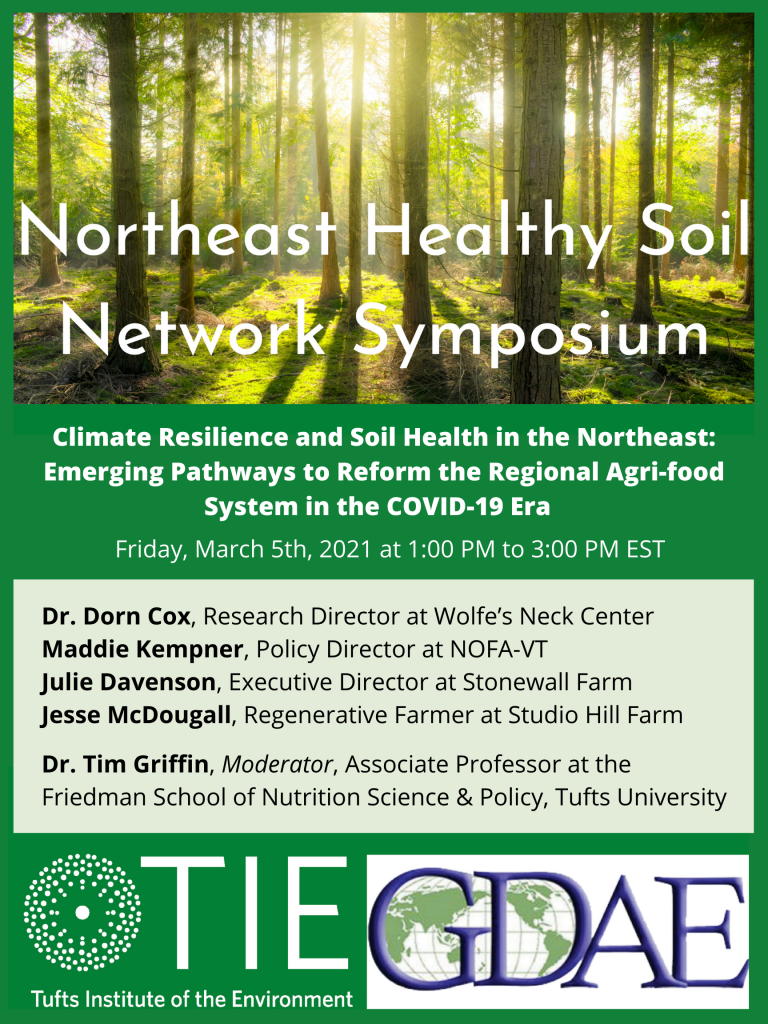
On Friday, March 5th from 1:00-3:00 pm, the Northeast Healthy Soil Network, in partnership with the Global Development And Environment Institute (GDAE) and the Tufts Institute of the Environment (TIE), was pleased to host a virtual panel of regional experts focused the state of the Northeast agri-food system one year into the COVID-19 pandemic.
Moderated by Dr. Tim Griffin, Associate Professor at the Friedman School of Nutrition Science and Policy. Speakers included Dr. Dorn Cox, Research Director at Wolfe’s Neck Center, Maddie Kempner, Policy Director at the Northeast Organic Farming Association of Vermont, Julie Davenson, Executive Director at Stonewall Farm, and Jesse McDougall, Regenerative Farmer at Studio Hill Farm. The panel began with presentations, followed by a Q&A, and concluded with the option to participate in our ‘building soils, building communities’ discussion using breakout rooms.
At a time when robust regional food systems are threatened by many different management, processing, and distribution challenges, this panel brought together a diversity of farmers, activists, academics, and policymakers who are responding to the agri-food system disruptions brought on by the pandemic. Many rightly find these shocks to the system worrying, but new opportunities have also emerged to support resilient farmers and eaters who care about soil health.
With a focus on climate change and the mitigating role of healthy soils, participants learned about ongoing changes to our food production and consumption on a regional scale and discussed policy ideas that could support the development of healthier ecosystems and more resilient agriculture in 2021 and beyond. Together, we explored questions about the future of farm viability, sustainable agricultural management, and the transition toward a carbon-neutral agri-food system.
This event was hosted on Zoom and is now available to the public as a recording (see below).
The Northeast Healthy Soil Network originated as a 2018 initiative of GDAE. Our mission is to form a working group of farm and food system stakeholders who agree on a regional need for soil-oriented agricultural policy reform. For more information about this movement, look below at our 2019 and 2020 conferences and materials.
Past conferences and materials
2020 Conference

The Northeast Healthy Soil Network Presents:
Agriculture and Climate in the Northeast: Soil and Ecosystem Health
Friday, February 21, 2020
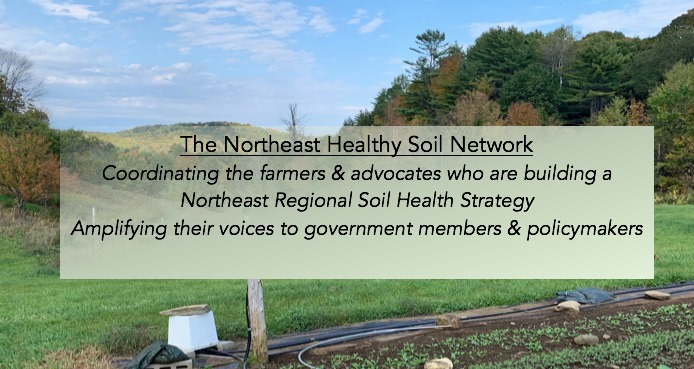
The event began on Thursday, Feb 20th, with an all-day in-depth policy working group for members of the Northeast Healthy Soil Network. Click here to see the Thursday, February 20th working group details.
The Symposium was jointly organized by the Tufts Global Development and Environment Institute (GDAE) and by the Tufts Institute of the Environment (TIE).
This event was made possible thanks to a grant from the French Ministry of Agriculture, for which GDAE and TIE are especially grateful. In addition, the event was also sponsored by the French Embassy in Washington D.C. and the Consulate General of France in Boston.
Event Materials
Video Content
Powerpoints and Documents
Next steps
To join the Northeast Healthy Soils Network outreach list, email northeasthealthysoilnetwork@gmail.com
Photos
Soild Health Symposium, Feb 21st Photos with case-sensitive password: Tufts
Friday, February 21st Schedule
8:30 am: Registration and Welcome
9:00 – 9:10 am: Welcoming remarks by the Consul General of France in Boston, Mr. Arnaud Mentré
9:10 – 10:45 am: Panel 1 on climate emergency and potential for agriculture to be part of the solution – framing the issue at the global/international level
- 4per1000, a global network for international cooperation on accelerating the adoption of best practices of agricultural transition.
- The status of soil health science: towards a systemic approach including both carbon storage and ecosystem services.
- Modeling the transition of French Agriculture in a 4per1000 future
- The challenges of the agro-ecological transition: reforming the European Union Common Agricultural Policy (CAP)
- How to incorporate agricultural transition into a Green New Deal at the national level in the US.
[expandsub1 trigclass=”noarrow greybar” title=”Click for Panel 1 Speakers”]
Panel 1
Moderator: Dr. Eric Kemp-Benedict, Stockholm Environment Institute U.S. Center Senior Scientist
Professor Timothy Griffin, Friedman School of Nutrition
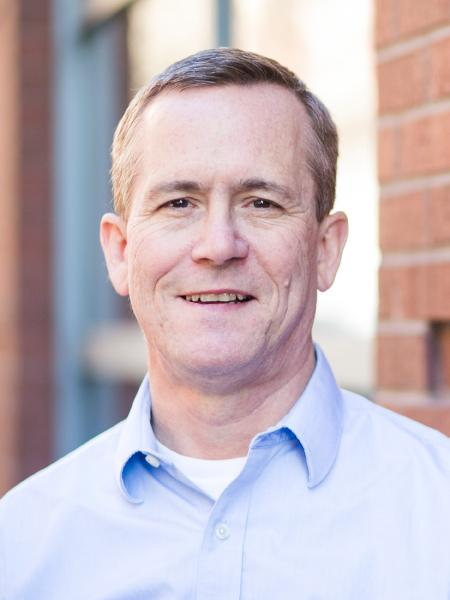
Timothy Griffin is Associate Professor at the Friedman School of Nutrition Science and Policy, Tufts University. At the Friedman School, he is Division Chair – Agriculture, Food and the Environment, and teaches classes on U.S. agriculture, agricultural science and policy, and the linkage between food system domains. In 2018, he was named as the inaugural recipient of a professorship in Nutrition, Agriculture, and Sustainable Food Systems. His current research focuses on assessment of sustainability across environmental, social and economic metrics, regional food systems, and climate change impacts on agriculture. He supervises doctoral students conducting research on topics ranging from precision agriculture to food access to water rights. He served as an Advisor to the 2015 Dietary Guidelines Advisory Committee, focusing on Sustainability, and also as a member of the National Academy of Sciences study Genetically Engineered Crops: Experiences and Prospects. He has given many scientific and public presentations on agriculture and the food system, and published nearly 100 peer-reviewed scientific articles. Prior to coming to the Friedman School, he served as Lead Scientist/Agronomist at USDA-Agricultural Research Service (2000-2008) and Extension Specialist in Sustainable Agriculture at the University of Maine (1992-2000), the first such position in the U.S.
Paul Luu – Executive Secretary of the “4 per 1000 Initiative: Soils for food security and climate”
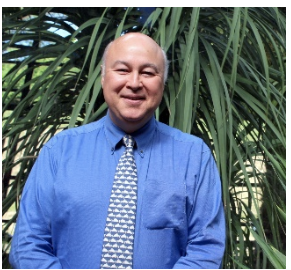
Paul Luu is an agronomist specialized in tropical agronomy, graduate from AgroParisTech, the Institute of tropical areas of Montpellier, the National High School of Agricultural Applied Sciences of Dijon, and the University of Montpellier (PhD in “population biology”). He was in charge of multilateral relationship with FAO, the World Bank and the CGIAR, of bilateral relationship with the countries in Africa and the Mediterranean area, as well as the management of the French food aid (200 000 t of grain per year), as Head of Mission and then as Head of Department.
In 2011, Paul Luu was appointed Director of Agropolis International, the international association that represents the scientific community “Agronomy – Environment – Biodiversity – Water” of the Languedoc-Roussillon area (one of the largest in the world with over 10,000 scientists). He contributed in particular to the installation of the CGIAR Consortium in Montpellier, International organization dedicated to agricultural research for the benefit of the poorest people on the planet. He joined the organization in September 2013 as Liaison Officer with the French Authorities, then as Protocol Officer. From September 2016, Paul is Executive Secretary of the “4 per 1000 Initiative: Soils for food security and climate”, launched at COP 21 in Paris.
Laure Bamière, Institut National de la Recherche en Agriculture, Alimentation et Environnement (INRAE)

Dr. Laure Bamière is an agro-economist and senior project manager at INRAE Joint Research Unit “Public Economics”, experienced in economic and spatially explicit modeling. She holds an MS in environmental and natural resources economics, and a PhD in environmental economics from AgroParisTech. In 2003, she joined INRAE, the National Research Institute for Agriculture, Food, and the Environment, where her work focuses on the links between agriculture, energy and the environment.
Her current research work investigates the costs of reducing greenhouse gas emissions and enhancing carbon sinks in agriculture. Dr. Bamière co-led two widely-respected national studies: the first identified opportunities for French agriculture to reduce GHG emissions; the second, “Storing 4 per 1000 carbon in soils”, targeted the agricultural sector’s potential for carbon sequestration. Since 2014 she is deputy head of the INRAE Joint Research Unit “Public Economics.”
Abad Chabbi
Dr. Abad Chabbi is a plant ecologist and soil biogeochemist. He worked at the Louisiana State University, USA; the Faculty of Environmental Science in Cottbus, Germany; the University of Pierre & Marie, Curie (UPMC), France; and the INRA research council where he has been leading the National Observatory for Environmental Research-Agro-Ecosystems, Biogeochemical Cycles and Biodiversity (http://www.soere-acbb.com) since 2009.
Abad Chabbi is currently Director of Research at the French National Institute for Agricultural Research (INRA) and his research centers on the linkage between soil carbon sequestration, nutrient availability and stoichiometry in the plant-soil system and their relations to land use management and climate change. He is also working with strategic Research Infrastructures and interested in science policy and societal challenges.
Ronnie Cummins – Regeneration International, Author of Grassroots Rising: A Call to Action on Climate, Farming, Food and a Green New Deal
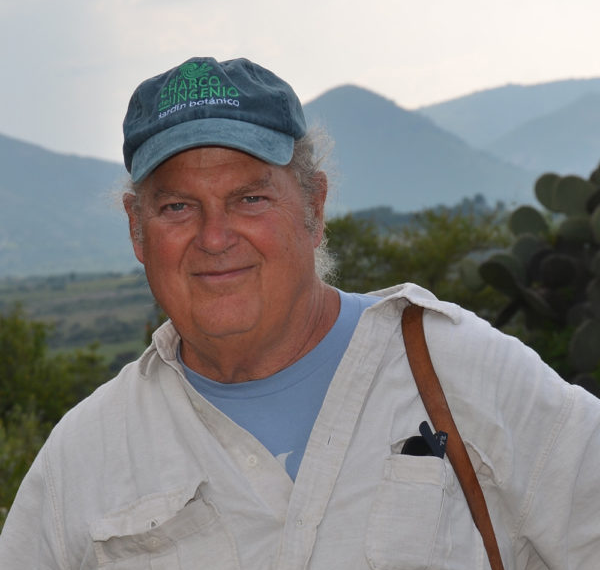
Ronnie Cummins is founder and director of the Organic Consumers Association (OCA), a non-profit, US-based network of more than two million consumers dedicated to safeguarding organic standards and promoting a healthy, just, and regenerative system of food, farming, and commerce. Cummins also serves on the steering committee of Regeneration International and OCA’s Mexican affiliate, Vía Orgánica. Ronnie authored and is releasing a book on policy recommendations for agricultural provisions of the Green New Deal, collected from grassroots networks of farmers and ranchers throughout the country.
[/expandsub1]
11:00 – 12:45 am: Panel 2 on the agricultural transition in the northeast: healthy soils for stronger viable farms and for climate adaptation and mitigation
- Advancing Healthy Soils policies in Massachusetts, Vermont, Maine, New York and beyond: incorporating soil health goals into state policymaking
- Challenges of dairy farming in the Northeast and the potential of partnerships to enable transition
- The Soil Health Initiative and Green America’s Soil Carbon Initiative – case studies, methodology and funding challenges
- Payment for Ecosystem Services: working group in Vermont
[expandsub2 trigclass=”noarrow greybar” title=”Click for Panel 2 Speakers”]
Panel 2
Moderator: Professor Tim Griffin
Dorn Cox – Wolfe’s Neck Sustainable Farming Center, OpenTEAM
Dr. Dorn Cox serves as project lead for OpenTEAM (Open Technology Ecosystem for Agricultural Management) and research director for Wolfe’s Neck Center for Agriculture & the Environment, a nonprofit research and education center, and a working organic farm on 600 acres of conserved land on the coast of Maine.
Dorn also lives and works on his family’s 300-acre certified organic farm in New Hampshire. As a co-founder of the FarmOS software platform, the GOAT (Gathering for Open Ag Tech) and Farm Hack community, he is passionate about sharing open source agricultural tools, ideas information and inspiration to accelerate innovation and quantify environmental services from regenerative agriculture. In 2018 his work as a NACD Soil Health Champion was recognized with the inaugural Hugh Hammond Bennett award for excellence in conservation given by the National Association of Conservation Districts, and in 2019, Dorn was awarded the Food Shot Global Ground Breaker prize. He has a PhD from the University of New Hampshire in Natural Resources and Earth Systems Sciences
Caro Roszell – Soil Carbon Program Coordinator at NOFA Mass
Caro Roszell is currently coordinating the NOFA Mass Soil Carbon Proxy Tests, which measure the level of biodiversity and other aspects of soil health that are attributable to building soil carbon. These tests will help farmers get an idea of how well your soils are supporting life and storing carbon.
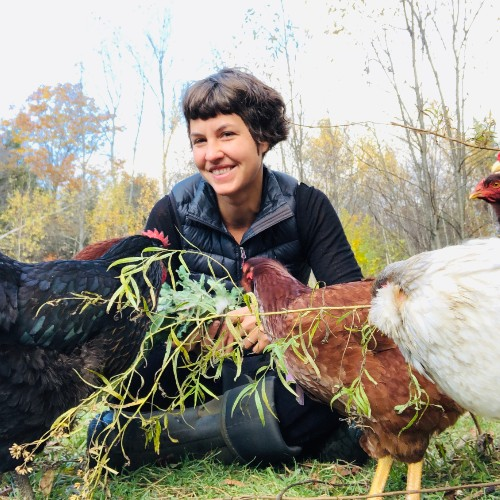
Caro has worked with the Northeast Organic Farming Association for over 4 years filling various roles. She is an experienced program manager, educator and consultant in organic and regenerative agriculture with a specialization in soil health assessment, soil carbon sequestration and small-farm practices for enhancing soil ecosystem function.
Passionate about projects which support the regeneration of regional ecosystems and the development of economically, socially, and ecologically-interconnected communities.
Ian McSweeney – The Agrarian Trust
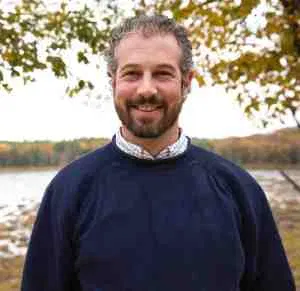
Ian McSweeney, Organizational Director of the Agrarian Trust, is working to create a local Agrarian Commons through establishing 501(c)(2) land-holding entities to support land access and tenure for the next generation of farmers.
Ian’s career and his life’s work has been focused on the human connection to soil and food. Most recently, he served as Executive Director of the Russell Foundation, a private foundation focused on assisting landowners and farmers through customized approaches to farmland ownership, conservation, management and stewardship. Ian has also participated in many farmland and food systems initiatives and has served as a consultant to a number of organizations, locally, regionally and nationally. He has served on zoning, conservation, planning and agricultural Boards and Commissions, County Conservation District, Regional Planning Commission and University Extension Coverts Program. Additionally, Ian speaks on farmland transfer, conservation, secure tenure, and fundraising models around the country. Ian has been recognized as a 40 under 40 leader in NH and selected for the Leadership Institute at Food Solutions New England.
Peter Lehner – EarthJustice
Peter Lehner directs Earthjustice’s Sustainable Food & Farming Program, developing strategies to promote a more environmentally sound agricultural system and to reduce health, environmental, and climate harms from the production of our food.
From 2007–2015, Peter was the Executive Director of the Natural Resources Defense Council and the NRDC Action Fund. Among other new initiatives, Peter shaped a clean food program with food waste, antibiotic-free meat, regional food, and climate mitigation projects.
From 1999–2006, Peter served as chief of the Environmental Protection Bureau of the New York State Attorney General’s office. He supervised all environmental litigation by and against the state. He prosecuted a wide variety of polluters, developed innovative multi-state strategies targeting global warming and air pollution emissions from electric utilities, and spearheaded novel watershed-wide enforcement programs.
Peter previously served at NRDC for four years directing the clean water program where he brought important attention to stormwater pollution. Before that, he created and led the environmental prosecution unit for the New York City Law Department. He clerked for Chief Judge James Browning of the Ninth Circuit.
Didi Pershouse – Author of the Ecology of Care
Didi Pershouse is the author of The Ecology of Care: Medicine, Agriculture, Money, and the Quiet Power of Human and Microbial Communities and Understanding Soil Health and Watershed Function. She teaches participatory workshops both in-person and online, helping to connect the dots between soil health, human health, water, and climate resiliency. She is the president of the Soil Carbon Coalition, the founder of the Center for Sustainable Medicine and the Land and Leadership Initiative, and a co-founder of the “Can we Rehydrate California?” Initiative. She was one of five speakers at the United Nations-FAO World Soil Day in 2017. Didi will be giving a short summary and her impressions of the activity of the discussion the Northeast Healthy Soil Network held on Thursday.
12:45 – 2:00 pm: Luncheon Buffet
2:00 – 4:00 pm: Afternoon Workshops Track One: Building the Heathy Soil Network in the Northeast US
Strengthening and Broadening the Northeast Healthy Soil Network: towards a regional coalition (2 sessions)
Session 1: Economic incentives and funding streams needed to ensure the implementation of successful healthy soils policies
- Report from Thursday Working Group.
- Review of existing practices for healthy soils funding.
- Development of specific proposals for economic incentives and funding.
2:00 – 4:00 pm: Afternoon Workshop Track Two: International Case Studies hosted by the 4per1000 initiative, moderated by Paul Luu
A conversation with French and American experts on the challenges and opportunities of agricultural transitions across the world with Laure Bamière (INRAE), Abad Chabbi (INRAE), Tim Wise (Small Planet Institute), Seth Itzkan (soil4climate)
4:00 – 5:30 pm: Afternoon Workshops Track One: Building the Healthy Soil Network in the Northeast US
Session 2: Reviewing and discussing healthy soil bills in Northeast States
- Report from Thursday Working Group.
- Sciences and measurement methodology.
- Strategy for promoting and implementing healthy soil legislation.
5:30 pm: light refreshments/closing reception.
2019 Conference

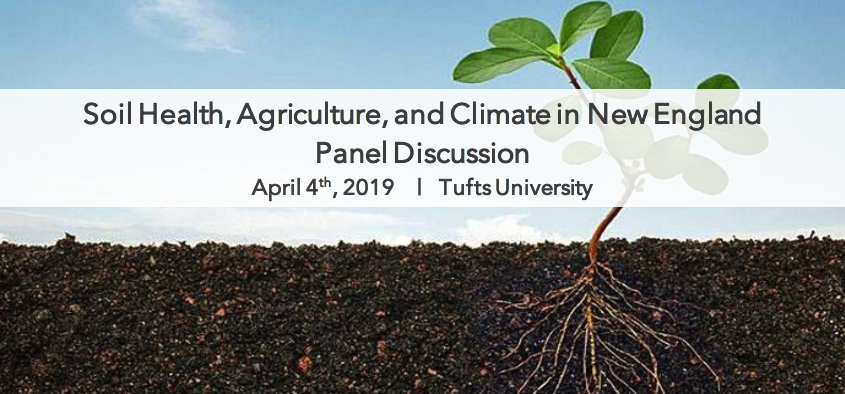
On April 4th, GDAE, in collaboration with the Consulate General of France, Tufts Institute of the Environment, and the International 4 per 1000 Initiative, sponsored a forum and panel discussion on “Soil Health, Agriculture, and Climate in New England”. Presentations at the panel reflected the work of a team of food system advocates, including farmers, researchers, students, and policymakers aiming to launch a Soil Health Initiative that will enhance and expand the regional system of soil management in New England States.
Speakers included:
Dr. Timothy Griffin, Tufts Friedman School
Ellen Griswold, Maine Farmland Trust
Julie Davenson, Executive Director of Stonewall Farms
Didi Pershouse, Author of “The Ecology of Care”
Sylvain Maestracci, French Embassy in Washington D.C.
View event meeting notes
See event flyer
Presentations
Jonathan Sanderman, Woods Hole Research Center, “Soil carbon sequestration: from potential to reality“
Paul Luu, Executive Secretary of 4 per 1000 Initiative, “The 4 per 1000 InitiativeGeneral Presentation”
The International 4 per 1000 Initiative, launched by the French government, aims to promote greenhouse gas emissions reduction though greater carbon absorption in agricultural soils. “4 per 1000” refers to the great potential for carbon absorption through practices that increase soil carbon sequestration by 0.4% per year, both to combat climate change and to increase food security.
Will Szal, Economics at Regen Network, “Regen Network”
Sylvain Maestracci, Agricultural Counselor, French Embassy in Washington D.C, “Soil Health, Agriculture & Climate in New England – 4p1000 initiative“
Steven Keleti, Tufts Northeast Healthy Soils Initiative, “Healthy Soils Legislation and Policy“
Julie Davenson, Executive Director of Stonewall Farms, “Stonewall Farms“
Didi Pershouse, Author of “The Ecology of Care”, “The Soil Sponge: The living matrix that supports life on earth“
Climate smart or regenerative agriculture? Defining climate policies based on soil health, Anne-Marie Codur and Josephine Watson, GDAE Climate Policy Brief #9, April 2018
Hope Below Our Feet Soil as a Climate Solution, Anne-Marie Codur, Seth Itzkan, William Moomaw, Karl Thidemann, and Jonathan Harris, GDAE Climate Policy Brief #4, April 2017
Additional Articles and Resources
Soil Health Initiatives in New York: Building Momentum, NOFA-NY, 2019
Farmers Are Excited About Soil Health. That’s Good News for All of Us., Karen Stillerman, Union of Concerned Scientists, April 2019
Healthy Soils to Cool The Planet: A Philanthropic Action Guide , Betsy Taylor, Breakthrough Strategies and Solutions, February 2019
Climate Instability and Agriculture: The Challenge and Solution, Fact Sheet, Earthjustice, February 2019
Managing for soil carbon sequestration: Let’s get realistic, William H. Schlesinger, Global Change Biology, November 2018
Summary of State Efforts To Promote Healthy Soils and Soil Carbon Sequestration, Regeneration International, July 2017
“Understanding Soil Health and Watershed Function: A Teacher’s Manual”, Didi Pershouse, August 2017
Soil Health Institute
The Regen Network
Soil Carbon Coalition
Sponsors
This event was sponsored by GDAE at Tufts University, the Friedman School at Tufts University, Tufts Institute of the Environment, the international 4 per 1000 Initiative, and the Consulate General of France in Boston.

